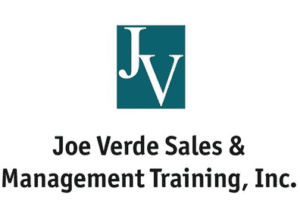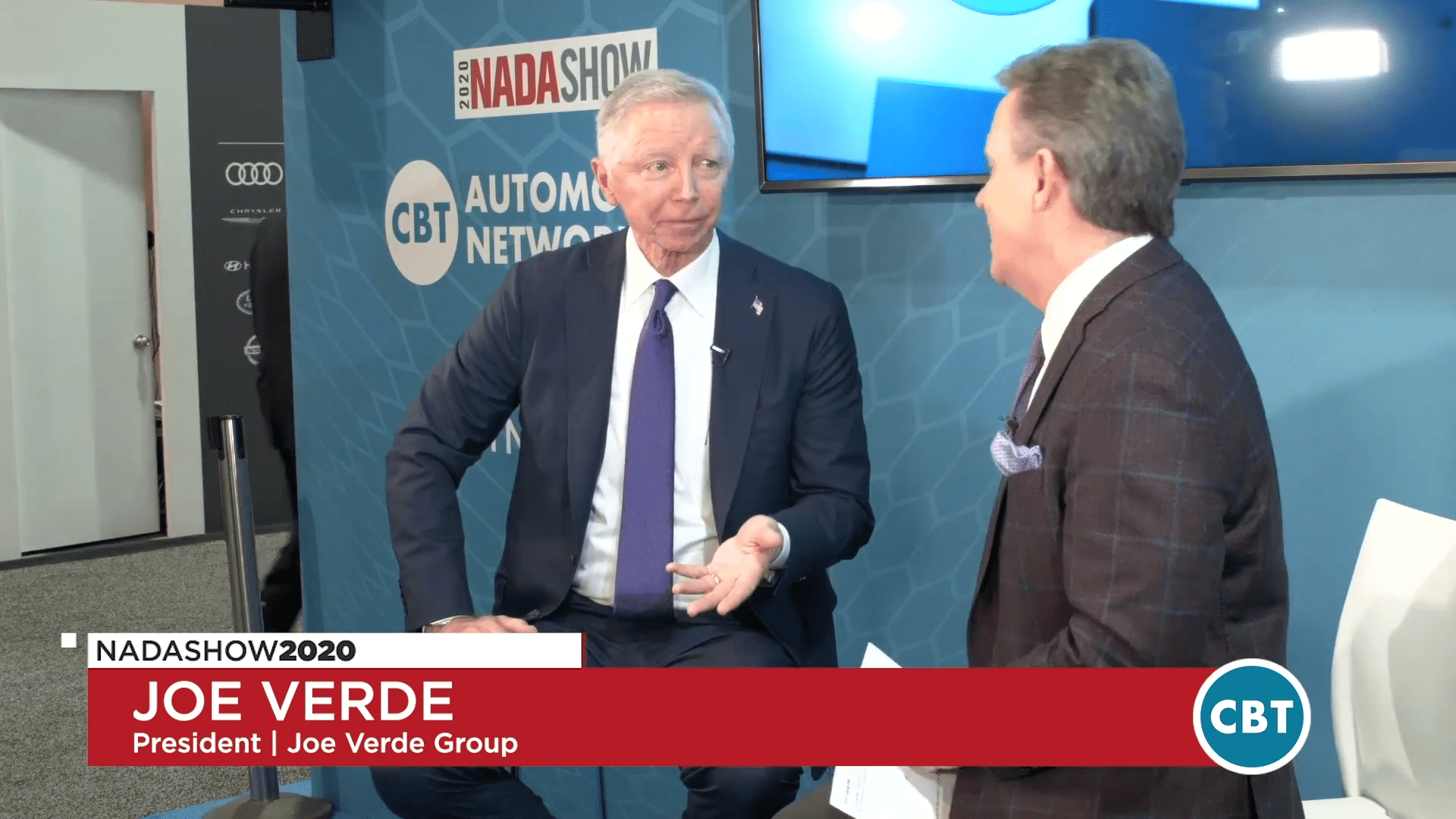Recently, the CBT Automotive Network was on-location at NADA 2020 in sunny Las Vegas where host Jim Fitzpatrick spoke with automotive retail and training legend Joe Verde, President of the Joe Verde Group.
 VIDEO TRANSCRIPT:
VIDEO TRANSCRIPT:
Jim Fitzpatrick: There are a couple of things that I want to talk about and some of the things in anticipation of you coming out today, some of the people that wrote in and said, “Hey, you’re going to be interviewing Joe at NADA.” Let’s talk about gross profit. That’s near and dear to every dealer’s heart. We hear margin compression. That’s gross profit, right? And why is gross profit so low?
Joe Verde: The first part’s an easy question. You can’t mark all the cars down and hold much gross.
Jim Fitzpatrick: That’s exactly right.
Joe Verde: There’s no rocket science to some of this stuff. And so many dealers have everything at that market price or everything is marked down to invoice so they can compete with the guy down the street who’s doing invoice. But all of that, if you just think about it, all that assumes everybody saw all the pricing at all the dealerships. And what surprised me is I read that some of the guys are losing money on used cars and they can’t make gross. Well, that assumes too, that if you mark it at the same price everybody in town has it, they didn’t see it in real life and no two cars are alike. Even two white ones that are sitting there. Well, we’ve got the exact same car down there and it’s cheaper. It’s not the same. Some people sell rentals and mark them down or have some other issues that we don’t know about. This one came in and you tell the story. All cars are different. You’ve done this.
Jim Fitzpatrick: Right. And what’s the percentage of people that come in on a specific car off the internet that actually buy that car? It’s low, right?
Joe Verde: Hardly anybody buys the car they meant to buy because it’s just like I’m looking up a new Denali, I’m thinking about getting one. And I went through and I priced everything and tried to build my own, but then it’s got this whole list of other stuff and it made me go, “Oh yeah, there’s more stuff I’m going to probably want.” So we don’t end up with a black one or a white one, whatever we want. We don’t end up with the same model, part of the time. And sometime, we don’t even buy the Denali, we end up buying a Chevy or a Ford.
Jim Fitzpatrick: That’s right.
Joe Verde: So what they say they want online, it almost doesn’t matter.
Jim Fitzpatrick: I know. So what it boils down to in a lot of cases with gross profit is having that salesperson trained. That’s why it’s always a pleasure talking to you because I think it’s kind of a lost art with many dealers. They spend so much of their time and effort in the digital space that they go, “Oh, wait a minute. We got 25 guys on the showroom floor that we don’t train every day. And meanwhile, were worrying about our low gross profits.” Do you think if you offered proper training, to your point, you’d see an increase?
Joe Verde: I just had a guy shake my hand and he said, “I went through, I read one of your books, how to make a hundred grand.” And he said, “I made a hundred grand every year since then.”
Jim Fitzpatrick: Isn’t that great?
Joe Verde: And same thing, we have people over there been to class. Class is 1200 bucks. It changes your life forever. But people say, some dealers say, “Well, I’m not going to go train this guy.” I had a guy the other day said, “I’m going to see if he works out before we train him.” They said that like 50 years ago. We don’t need to say that anymore. We need to get these guys up to speed.
Jim Fitzpatrick: Why is it that we’re so afraid to train an individual that we felt good about, good enough to put them on the payroll, put them on the healthcare, bringing them into the organization, maybe even give them a key fob to open up the dealership, and yet when it comes to training, we go, “Let’s go see what they’re made of first.”
Joe Verde: I can’t imagine hiring somebody. When we hire people at our company, we spend weeks training them and it cost us a ton. Why would you hire somebody that you don’t see the value in trying to make them good? If they’re not worth training, they’re not worth hiring.
Jim Fitzpatrick: That’s right.
Joe Verde: And if they don’t have a suit and you’re not willing to buy them one, if you want a suit, you can buy inexpensive suits at inexpensive suit store. Why would you not help this person that you see the potential in get good? For dealerships to sell more, salespeople have to sell more. But that’s lost. There is not a single sales training message in this entire room.
Jim Fitzpatrick: I know, I know. And when it boils down to it, when push comes to shove, that’s where it’s going to happen. We talk about a customer’s experience with a dealership, as we talked before we started recording today. It’s never with the dealer or the GM or the GSM, or maybe even sales manager, it’s that salesperson. That’s what they’re talking about. Right?
Joe Verde: It is. And when you follow that growth train down the line, if you’re marking everything down, the first dealership or the last dealership I worked at marked most cars down, but they left a few. So I had to sell the ones in between to make money. And I had to explain why this one’s not for sale like that one is. But that’s okay. But then once the salespeople start talking to somebody, they say, “Well, I’m looking for a Denali. I want black, I want the sunroof, I want the package. How much are they?” Salespeople think they just got a price objection. So they say, “Oh, wait. We’re real negotiable. I can save you two grand on this thing and we’ve got the-”
Jim Fitzpatrick: It wasn’t even about price.
Joe Verde: It wasn’t about price. So what do you want to spend? How much time do you have? What’s your payment rates? Do you owe anything on your trade? When you talk about numbers, that’s the transaction. If you talk about what’s important to people, that’s the emotional part that builds the value. How are you going to use that? I’m going to pull my boat to the river. How and where do you go? And you talk about it. When you’re talking about the boat and the truck and the river, you’re building these positive emotions. And why would you mess it up with, “Don’t worry, we’ll make it cheap.”
Jim Fitzpatrick: Unbelievable. They never asked to make it cheap, they just want it right.
Joe Verde: And then they close on price. Don’t worry. Whatever we have to do to earn your business today. We’ve been taught so many wrong things. You and I, I’m guessing too, were taught to select a vehicle based on what they want to spend. Well if you do that, it gets really tight because the numbers have to get tight. If I find the perfect car for you, I’ve never found anybody that didn’t pay more when I found the right car for them. Not the right price car. But I’ve had a lot of people and I said, “You ought to buy that car instead.” You go inside, you grind out a deal, they’re mad at you if they buy it, because they didn’t want it anyway. And most don’t buy it. Gross is relative to value and it can’t … Dealers devalue themselves by marking every single car on the lot down. You’re saying, “We never worth what we’re asked, never were worth it. And now we’ll take even less.”
Jim Fitzpatrick: What do you say to the dealer that’s listening to this conversation saying, “Well, the relevancy of today’s salesperson isn’t what it was 20 years ago.”
Joe Verde: I don’t even know how that makes sense. Everything in this convention and everything dealers do is to put a customer on the line. And then they got this guy or this woman, they hired, they didn’t teach them anything. They blame them when they don’t sell more. Why did you sell more? Because you didn’t teach me how. And we were talking, the average has kind of always hovered around 10 and a half, 10.6. Okay. But I’ve got a sign in our booth. This woman sent us a note. She said, “I sold 42 cars this month after your training.” Okay. When you take out the 30s and 40s and 50s and hundreds out of that average, the average salesperson in real life, selling seven to eight cars.
Jim Fitzpatrick: Yeah, you’re right.
Joe Verde: And that’s terrible. Especially since the dealer’s buying all this traffic.
Jim Fitzpatrick: I know. And if the average consumer is only shopping one and a half dealerships before they buy a car from what the studies are showing, why hasn’t the closing ratio skyrocketed? You would think that everybody walking into your dealership is a stone cold buyer, right?
Joe Verde: We’re talking price. Like Sean said, he walked on the lot, he and his wife were driving somewhere and they stopped to look at a car. Saw a guy inside looking at him but never came out.
Jim Fitzpatrick: Isn’t that amazing? Right.
Joe Verde: Why else are we there?
Jim Fitzpatrick: But in so many cases, you can’t blame that salesperson that won’t come out or you can’t blame the salesperson that cuts right to price. It’s really depended on the dealer. This is on the dealer to take control of their showroom and train these individuals, right?
Joe Verde: Who’s between the dealer and the salespeople?
Jim Fitzpatrick: Yeah, the managers.
Joe Verde: In real life, everything that I try to do has to go through my manager. And I can have the greatest goals, I can have the greatest plans, I can have the greatest scripts, sales process, but if I can’t get him to follow through, nothing changes because I’m not out there on the showroom floor. And we laugh in class about how poorly trained salespeople are. In the class that I ask, “So who’s had less training than the poorly trained salespeople?” The guy in charge.
Jim Fitzpatrick: Gee, that’s exactly right. And then if we’re trying to grow our own managers and our own GMs and eventually dealers one day, when were they ever shown how to take good care of these new recruits coming into the dealership? It seems to be a never ending cycle.
Joe Verde: But didn’t most dealers start on the line, become a manager, sell a bunch of cars, get a buy in, and they never got trained either. So all the things we talk about in real life are new to most dealers. I don’t care how long they’ve been doing it. And it doesn’t make any sense. And if the manager doesn’t know how to train, it’s kind of like you take a pro ball player. Somebody’s awesome, the best in the league. But that doesn’t make him a good coach just because he’s a good player. And that’s who we promote. It’s frustrating for us. We’ll teach somebody how to sell 20, 30 cars and the next day they’re a manager. We didn’t teach him to be a manager. We only taught him how to sell. So now if you want him to be a manager, you need to get him to the management course so we can teach him that. That’s the frustrating part. That’s why all this stuff doesn’t work.
Jim Fitzpatrick: That’s right. And we’re heading into all the … I just interviewed the Cox Automotive Analyst, Chief Economist rather. And he said we’re going to be looking at maybe as many as 400,000 less new vehicles sold in the US in 2020 than was sold in 2019, 400,000 less. And yet, that’s still a strong number to be at like 16.6. We’re walking into maybe this new economy where dealers will sell less, which means there’s even more of an importance on the training of salespeople and managers.
Joe Verde: How can dealers that have been in a 17 million unit for three years now or whatever it was, how can you be in a record unit year and have a terrible year?
Jim Fitzpatrick: That’s right. I know.
Joe Verde: That means somebody’s stealing deals. And the way they steal deals is to out trade. We always talk about you’re not competing with the dealership down the street. You’re only competing with the salesperson that customer will talk to at the dealership down the street. And that person’s a seven or eight car guy, haven’t had any training, don’t know anything about anything, they’re only going to talk price, they can’t close. And they’re going to say, “See you later.” So when somebody says, “I’ve been down the street,” I already mentally know that they didn’t do a good job. They came to buy. You just said one and a half. They stopped at one and a half stores. That means they went to the Ford store to buy the Ford. And if they don’t buy it from your Ford store, they’re going to buy it somewhere else. And they may not even end up with a Ford at that point.
Jim Fitzpatrick: We’re in a new normal in the auto industry and we’ve got disruptors like Carvana that people can go right on their app and buy a car and have it delivered to their front door and bypass the showroom experience altogether. Now granted, that’s a very small number. It’s only 176,000 vehicles last year. Impressive for them. But if we don’t change the way we’re taking care of today’s customer, they’re going to change the way we do business, right? They’re going to change our profits and our bottom line and it’s not going to be a pretty picture.
Joe Verde: More and more dealer groups are buying all the stores and there’s fewer and fewer regular dealers anymore. They’re the lone dealers. And if they don’t start taking action, if they don’t start training their managers, if they don’t start training their salespeople, they’re next. And a lot of people would say, “Hey, I’m ready because I want to sell out.” Okay. If you’re really serious about selling, raise sales, raise profit. Because that’s how you get more for your …
Jim Fitzpatrick: That’s right.
Joe Verde: My buddy sold his dealership and he got big tons of money for the property. Not because he made money.
Jim Fitzpatrick: Because it was such a champ location.
Joe Verde: It was my best friend, I could never get him to do training. It’s like, “No, you don’t understand. You can’t make gross.”
Jim Fitzpatrick: Yeah, isn’t that something? Wow. Joe Verde. I want to thank you so much for spending some time with us here at CBT. It’s always a pleasure. For dealers that are listening to us right now have this discussion, wake up and smell the coffee. It’s 2020. Train your salespeople, train your managers, and you’ll be happy with the end result. There’s no better person in the industry, I think, and I’ve been in it for 30 plus years, that does a better job trading salespeople and managers than the Joe Verde Group. I want to thank you again so much for joining us. It’s always a pleasure. So dealers, do what you got to do. Check out Joe Verde Group and let’s make 2020 a year to remember rather than crying in our beers about low gross profits. So thanks a lot.








